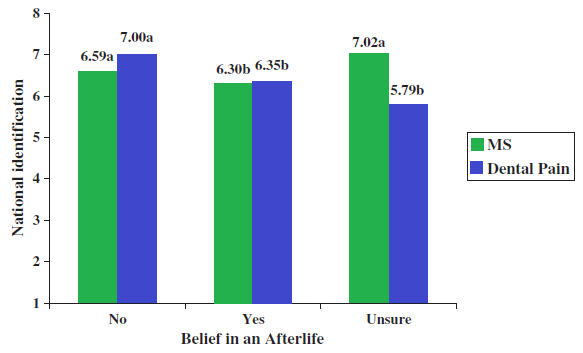When people are reminded about death, they get defensive. In the West, at least, they will tend to get more patriotic and more supportive of their cultural norms (Asian cultures tend to react a little differently). They also tend to get more religious.
Here’s the question: do people get more religious because they want to believe in a life after death? Or do they get more religious because they need more certainty in general?
So what Zachary Hohman and Michael Hogg, at Claremont University in the USA, did was to manipulate students’ feelings about the afterlife by getting them to write a short essay on how they would feel if there definitely was an after life, or if there definitely wasn’t an afterlife, or if they did not know whether or not there was an afterlife.
Half of them were also asked to described how they felt about the thought of their death – the other half were asked to think about dental pain. Afterwards, they were asked a series of questions about how American they felt:
“how much they would stand up for America, how much they identified with being American, how much of a feeling of belonging they had as an American, how important to their sense of self being American was, how much they liked Americans as a whole, how similar they felt to Americans, how well they felt they fit as an American, and what their overall impression of America was”
So it’s a little bit complicated, but the graphic helps to explain what happened. Basically, those who were made to feel certain about the afterlife – either that there was one, or that there was not – felt just as patriotic whether they were asked to think about their death or about toothache.
But those who were made to feel uncertain about the afterlife actually became more patriotic if they were also reminded of death.
This is a challenge to conventional ideas about why people become more religious when they think of death. According to Hohman and Hogg, what’s happening here is that it isn’t the fear of ceasing to exist that freaks people out, but rather the uncertainty over when it will happen and what happens afterwards.
They respond to those feeling of uncertainty by trying to crystallise their own notions of who they are – by identifying more stongly with ethnic, cultural, or religious groups, for example.
All this is fascinating because it once again highlights that non-believers and believers are similar in many ways (see The Happiness Smile), and that the people with the greatest emotional problems are the in-betweeners.
![]()
Hohman, Z., & Hogg, M. (2011). Fear and uncertainty in the face of death: The role of life after death in group identification European Journal of Social Psychology DOI: 10.1002/ejsp.818
 This article by Tom Rees was first published on Epiphenom. It is licensed under Creative Commons.
This article by Tom Rees was first published on Epiphenom. It is licensed under Creative Commons.














